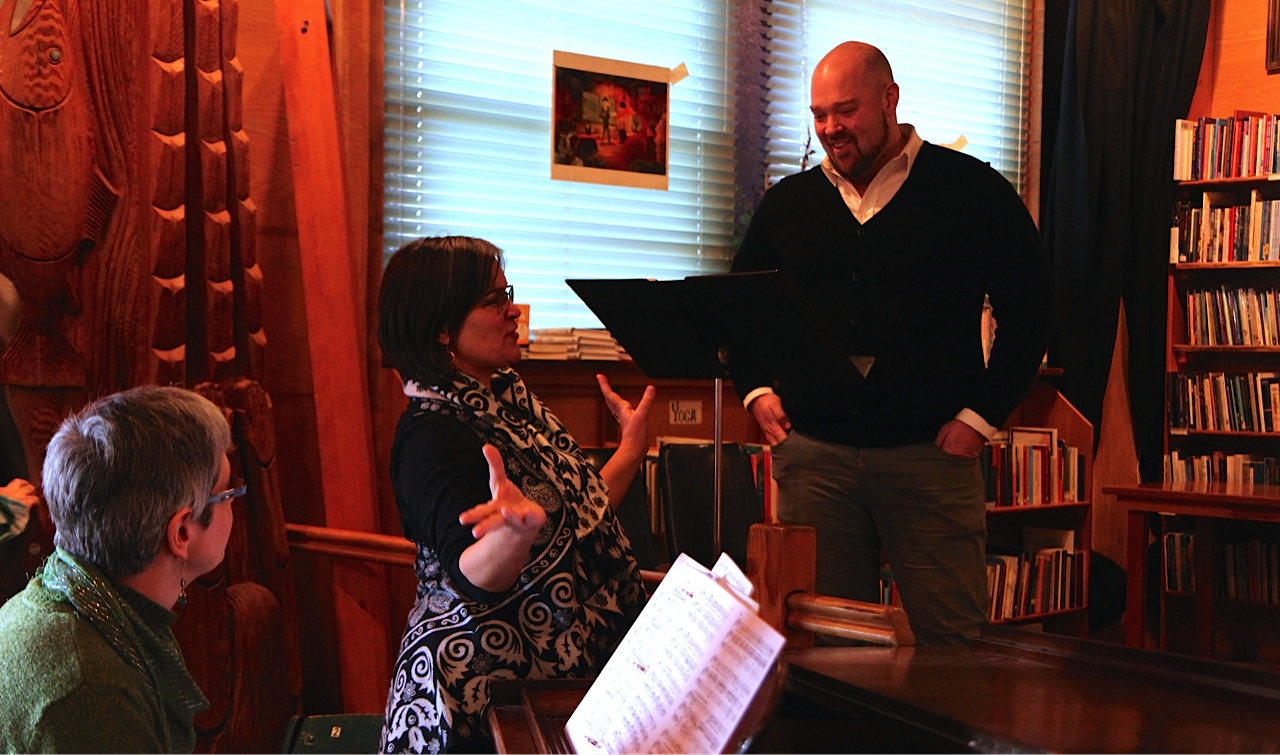By Daniel Buckwalter
My younger self would have had to catch my breath and hold back a tear at the sight of Mimi dying on stage at the end of La bohème, singing one last time, “I don’t know why they call me Mimi.”
Yes, I did feel the sadness of it all on Jan. 27 — the first of two performances by Eugene Opera of Giacomo Puccini’s classic at the Hult Center, which concludes Sunday afternoon — but I was taken more with the relaxed yet sharp banter of the four bohemians as well as the characters Mimi and Musetta.
Never mind that this version of the opera updates the time period from the 1830s to the early 20th century and thereby references the 1918 influenza pandemic instead of tuberculosis —Eugene Opera stays true to the music and to the story line. The result is a smart, compact, fast-moving opera with some of the prettiest arias to be heard, and the appreciative audience at Silva Concert Hall on opening night rose as one for a deserving ovation.
I highly encourage anyone to take in Sunday’s matinee of La bohème. You will see right off the carefree and loving nature of the four young housemates, the bohemians, as they struggle in poverty to launch their dreams in Paris.
The poet, the painter, the musician, and the philosopher scramble for fire wood and food, not to mention rent. The opening scene is dominated by Rodolfo (tenor Derrek Stark) and Marcello (baritone Nicholas Davis).
Soon, though, the seamstress Mimi (soprano Vanessa Isiguen) enters, and sparks immediately fly between her and Rodolfo. Together, they sing the magnificent “O soave fanciulla” (O gentle maiden) to close out Act 1 as they realize they have fallen in love with each other.
Act 2 brings us Musetta (soprano Brooklyn Snow) and “Musetta’s Waltz.” Musetta has an on-and-off combustible romance with Marcello, She also is, shall we say, a self-absorbed bohemian beauty who soaks men for the high life up and down the socio-economic ladder (particularly Alcindoro, bass Doremus Scuddder). Still, she and Marcello are in love, and their scenes bring comedic relief.
That comedic relief evaporates in Act 3 when the depth of Mimi’s illness is revealed by Rodolfo, and the audience is brought back to where the opera begins, a time frame when the influenza pandemic claimed the lives of an estimated 50 million people. It is a touching moment in the opera.
Act 4 brings Mimi’s death, in the apartment of the bohemians after Musetta valiantly tracks her down on the Paris streets. Mimi sings one last aria to Rodolfo from her deathbed, the bohemians are scattered in the apartment, lost in their thoughts. Mimi dies, and Rodolfo collapses in despair, then gathers Mimi in his arms as the curtain closes.
This is when I smiled and took a deep breath. La bohème is a smart and lively opera. There’s much to absorb with it, and, again, I highly encourage anyone to take in Sunday’s matinee.
Well done, Eugene Opera.
Eugene Opera performs La Bohème
When: 2:30 p.m. on Sunday, Jan. 29, 2023
Where: Silva Concert Hall, Hult Center for the Performing Arts, One Eugene Center (Seventh and Willamette streets), Eugene
Tickets: $15 to $79, available from the Hult Center box office, 541-682-5000, or online at eugeneopera.org or hultcenter.org











